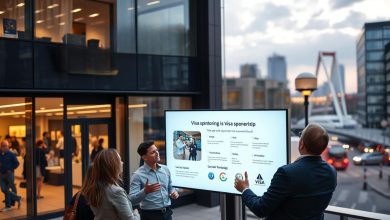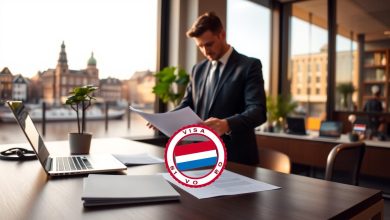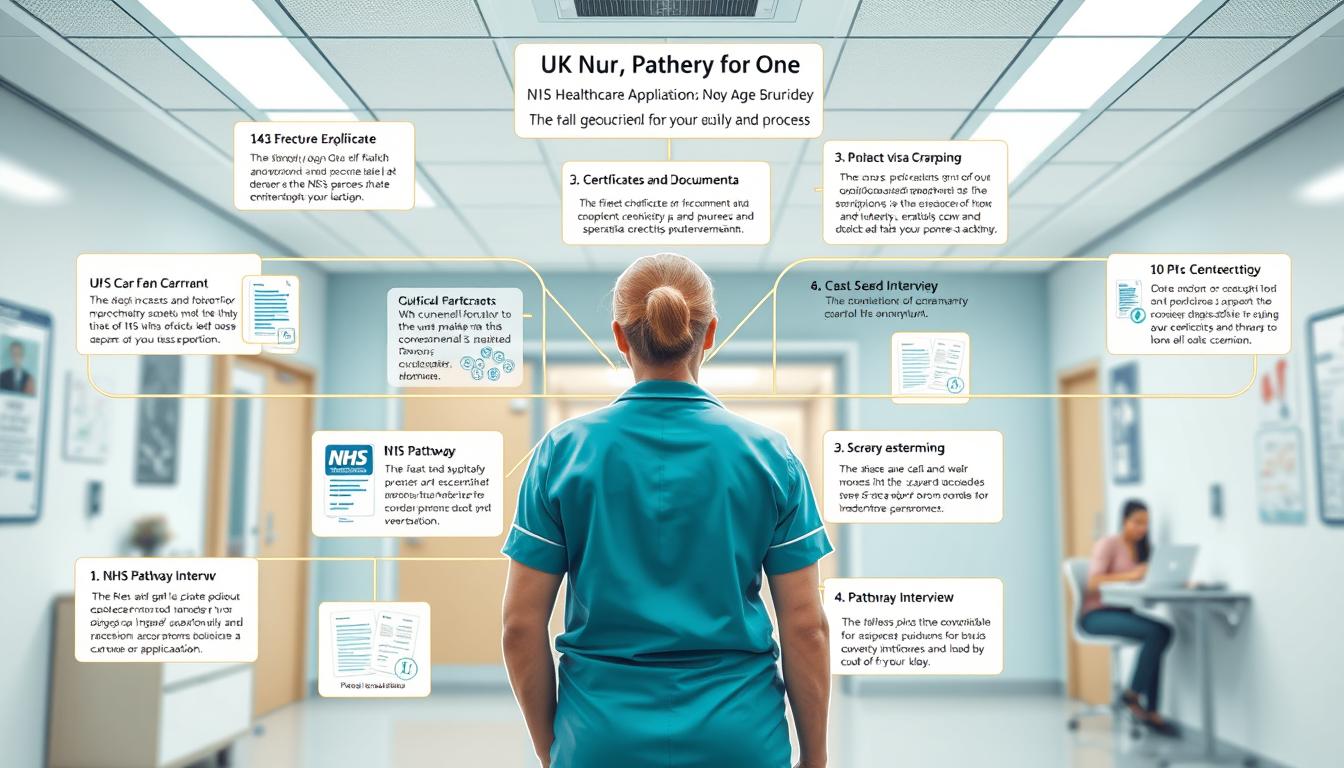Visa Sponsorship in Germany: Your Complete Guide
Anúncios
Navigating international employment opportunities requires understanding complex regulations.
For professionals eyeing roles in Europe’s largest economy, proper documentation ensures compliance with local laws. This guide breaks down the essentials of securing work authorization, highlighting pathways for employers and employees alike.
Non-EU nationals must obtain approval from German authorities before starting employment. The system offers multiple permit types tailored to different career scenarios, from short-term contracts to specialized roles. Processing times vary but generally span 1–3 months, depending on the category.
Companies registered with federal agencies can sponsor foreign talent, creating opportunities for skilled workers worldwide. This collaboration benefits both parties: businesses access global expertise, while professionals gain entry into competitive markets. Common options include the EU Blue Card for high-demand fields and permits for intra-company transfers.
Understanding these frameworks helps avoid legal pitfalls. Employers must verify eligibility criteria, while applicants should prepare thorough documentation. With careful planning, the journey toward international career growth becomes smoother and more predictable.
Understanding Visa Sponsorship Germany
Legal work status in the country hinges on two primary documents: visas and permits. These authorization tools serve distinct purposes but often work together to enable employment for non-EU nationals. Employers play a critical role by verifying eligibility and submitting required paperwork to local authorities.
Defining the Concept of Employer-Sponsored Authorization
Sponsorship occurs when a company formally supports a candidate’s application for legal work status. This involves providing proof of job offers, contracts, and compliance with labor market regulations. Employers must confirm that no qualified EU candidates are available for the role before sponsoring foreign professionals.
Work Entry vs. Long-Term Stay Permits
A work visa allows temporary entry for employment purposes, while a residence permit authorizes longer stays. Specific requirements depend on nationality:
- EU/EEA citizens: No additional documents needed
- U.S. or Australian nationals: Apply for residence permits after arrival
- Other nationalities: Obtain both documents before working
Some applicants mistakenly believe one document covers all requirements. In reality, both authorization types often complement each other to ensure full compliance.
Benefits and Advantages for Employers and Employees
Collaborative partnerships between companies and global professionals create mutual value in today’s interconnected job market. This system helps organizations fill critical skill gaps while offering workers access to new opportunities. Below, we examine how both parties benefit from structured employment frameworks.
Employer Benefits in Global Talent Acquisition
Businesses gain access to specialized expertise through international hiring. Key industries like technology and healthcare face acute shortages, making global recruitment essential. Benefits include:
- Diverse problem-solving approaches from cross-cultural teams
- Streamlined compliance through employer-of-record services
- Reduced hiring timelines for high-demand roles
One HR manager noted, “Hiring internationally transformed our innovation capacity overnight.” Companies also build market-ready teams with multilingual skills and global business insights.
Employee Advantages and Career Growth Opportunities
Professionals secure stable employment in Europe’s strongest economy while enjoying social protections. Key perks include:
- Exposure to advanced industry practices and technologies
- Clear pathways to long-term residency after several years
- Competitive salaries paired with work-life balance initiatives
These opportunities accelerate career trajectories. Workers gain transferable skills while contributing to projects with international impact, positioning themselves for leadership roles.
Eligibility and Requirements for Visa Sponsorship in Germany
Meeting eligibility standards forms the foundation for successful employment applications. While specific rules vary across permit categories, core criteria remain consistent for most foreign professionals seeking opportunities in Europe’s economic hub.
General Documentation and Qualification Criteria
Three pillars support most applications:
- Verified employment contract from a registered company
- Salary thresholds matching industry standards (€58,400 annually for STEM roles)
- Education validation through the Anabin database
Language certificates become crucial for customer-facing positions. A Berlin-based recruiter shared, “Candidates with B1 German proficiency secure approvals 30% faster.”
Health Insurance, Financial Proof, and Job Offer Essentials
Applicants must demonstrate:
- Comprehensive medical coverage from approved providers
- Minimum savings of €11,208 for initial living costs
- Employment contracts specifying role duration and responsibilities
Public insurance plans typically satisfy health requirements. Contracts should clearly outline salary details and working hours to meet labor authority expectations.
How to Apply for a Work Visa and Residence Permit
Navigating legal requirements for employment authorization involves multiple coordinated steps. This process demands attention to deadlines, precise documentation, and understanding regional regulations. Below is a breakdown of critical phases to streamline approvals.
Securing a Job Offer and Determining Visa Necessity
Start by obtaining a formal employment contract with clear salary details and job responsibilities. Employers must specify contract duration and compliance with labor laws. “Contracts lacking precise terms often face delays,” notes a Frankfurt immigration consultant.
Check if your nationality requires an entry document. U.S. citizens can apply for residence permits after arrival, while others must secure visas beforehand. Consulate websites provide updated lists of exempt countries.
Navigating the Registration and Permit Application Process
After arriving, register your address at local offices within two weeks. Bring your passport and rental agreement. This step unlocks access to essential services like banking.
Next, gather documents for the residence permit application:
- Valid health insurance proof
- Employment contract copies
- Completed application forms
Book appointments early with Foreigners’ Authorities, as wait times vary. Processing typically takes 1-3 months. Once approved, you’ll receive a card authorizing work and residence simultaneously.
Types of Work Visas and Permit Options in Germany
Germany’s job market attracts global talent through structured authorization programs tailored to different career paths. Professionals can choose from multiple categories based on qualifications, experience, and employment goals. Matching personal circumstances with the right documentation ensures smoother approvals and long-term success.
Qualified Employment, EU Blue Card, and Professional Visas
The EU Blue Card stands out for degree holders in high-demand fields like engineering or IT. It requires a job offer with a minimum salary of €58,400 (€45,552 for STEM roles) and offers permanent residency eligibility after 33 months. “The Blue Card remains the gold standard for STEM professionals,” notes a Munich-based immigration lawyer.
Other options include:
- Work Visa for Qualified Professionals: Requires recognized degrees and contracts lasting 2+ years
- Professionally Experienced Workers Visa: Accepts vocational training certificates with 5+ years in technical roles
- Job Seeker Visa: Grants six months to secure employment locally
Self-Employment and Freelance Visa Alternatives
Entrepreneurs and independent contractors can apply through the Freelancer Visa (Aufenthaltserlaubnis für selbständige Tätigkeit). Requirements include:
- Proof of client contracts or business plans
- Financial stability to support operations
- Relevance to local economic needs
This permit suits consultants, artists, and startup founders. Approval rates improve with clear market demand evidence and German-language proficiency at B1 level or higher.
Key Documentation and Employer Declarations
Gathering accurate paperwork forms the backbone of successful employment applications. Missing or incomplete materials can delay approvals, making preparation critical. This section outlines core requirements and clarifies the financial pledge process.
Mandatory Documents and Proof of Qualifications
Applicants must submit these essentials:
- Notarized employment contracts with salary details
- Academic certificates validated through the Anabin database
- Professional licenses translated into German by certified services
Identification documents require apostille stamps for international recognition. A Berlin-based caseworker advises, “Always include color copies of passports and recent bank statements to avoid resubmission requests.” Language certificates become vital for roles requiring local client interaction.
Understanding the Declaration of Commitment Process
The Verpflichtungserklärung binds sponsors to cover living costs if applicants can’t support themselves. Eligible hosts include:
- Legal residents with stable income
- Registered companies operating for 2+ years
- Public institutions like universities
Sponsors prove financial capacity through tax returns or business audits. Fees range from €14.50 to €29, with validity periods matching visa types. This pledge reassures authorities that applicants won’t require public assistance during their stay.
Processing Times and Costs Associated with the Application Process
Understanding timelines and expenses helps applicants prepare effectively. Approval durations depend on permit categories, document readiness, and regional office workloads. Proper planning minimizes delays and unexpected fees.
Overview of Timeframes for Different Permit Types
Most cases resolve within 4-12 weeks. The EU Blue Card processes fastest at 4-8 weeks for STEM professionals with complete paperwork. General employment permits often take 6-12 weeks due to mandatory labor market reviews.
Seasonal peaks can extend wait periods. Summer applications sometimes face 2-3 week delays. Applicants from countries requiring extra security checks should add 1-2 months to standard estimates.
Cost Breakdown for Fees and Additional Charges
The standard processing fee costs €75 for adults. Declaration of Commitment payments range from €14.50 (minors) to €29 (adults). Translation services and document certifications often add €50-200 per application.
Budget-conscious applicants should request fee waivers early. Students and researchers sometimes qualify for reduced rates. Employers often cover these expenses as part of relocation packages.
For more information, explore the official visa website mentioned in this article:
You will be redirected to another website
FAQ
What is the difference between a work visa and a residence permit?
A work visa allows entry for employment purposes, while a residence permit grants longer-term stay. The latter often requires proof of employment, financial stability, and health insurance coverage.
How long does it take to process an EU Blue Card application?
Processing typically takes two to four weeks for approval if qualifications meet requirements. Delays may occur if additional documents or verifications are needed.
What financial proof is required for self-employed applicants?
Freelancers must demonstrate sufficient income, business plans, and client contracts. A minimum annual income of €45,000 is recommended for approval by local authorities.
Can employers sponsor foreign workers without a degree?
Yes, if the applicant has vocational training or specialized skills matching the job. The Federal Employment Agency assesses whether no qualified EU candidate is available.
Is private health insurance acceptable for residency applications?
Both public and private health insurance are accepted. Coverage must meet German standards and remain valid throughout the stay.
What is the minimum salary threshold for the EU Blue Card?
As of 2024, the threshold is €45,300 annually for most professions. STEM fields and medical roles may qualify with a lower salary of €41,041.80.
How soon can someone apply for a settlement permit?
After five years of continuous employment, individuals may apply. Holders of an EU Blue Card with B1 German proficiency can apply in 33 months.
Are language skills mandatory for all visa types?
German proficiency is not required for the EU Blue Card or skilled worker visas. However, basic knowledge improves integration and long-term residency prospects.
What fees apply for a freelance visa application?
The fee ranges between €75 and €110, depending on the region. Additional costs may include document translations and notarizations.
Can a job offer be conditional during the application process?
Employers must provide a binding job offer. Conditional agreements are not accepted by immigration offices for sponsorship purposes.
Published on: 24 de July de 2025

Sofia Kamara
Sofia Kamara is the founder of GoldenCred.blog, a platform built to guide students and young professionals in navigating international opportunities. With a background in public policy and international relations, Sofia has spent years helping people secure scholarships, sponsorship visas, and financial planning strategies for studying abroad.
She believes that accessible, accurate information is a powerful tool for change. Her writing combines practical advice with strategic insights, crafted especially for those eager to take bold steps toward education and career development in countries around the world.







